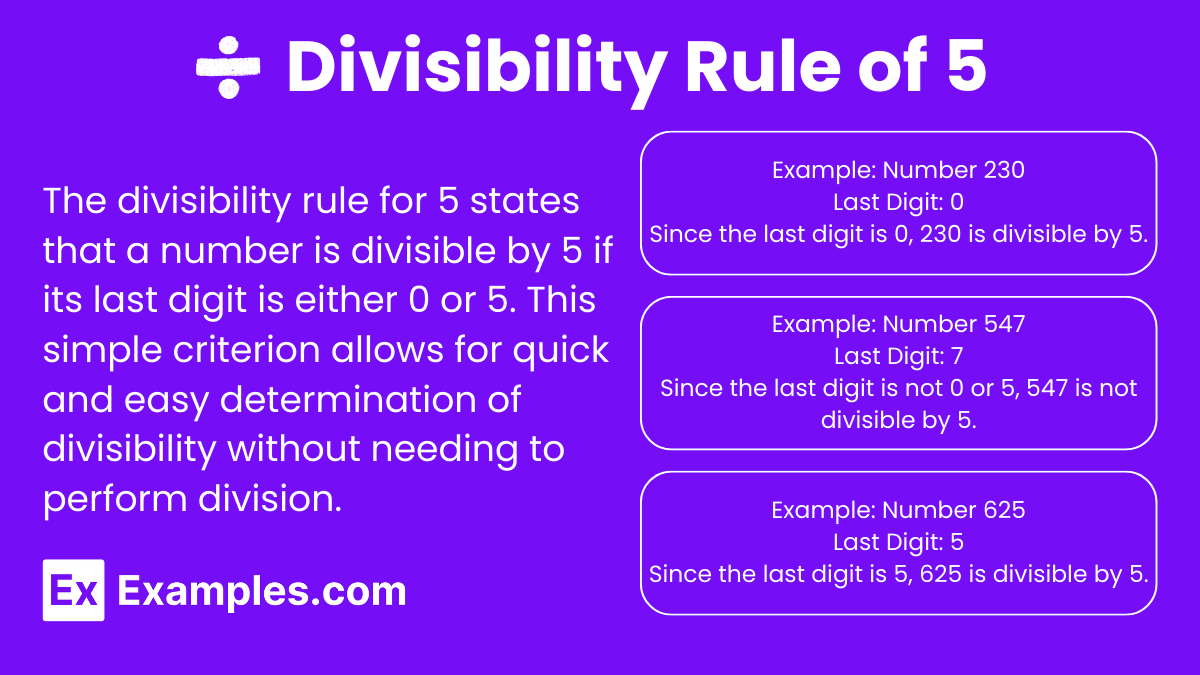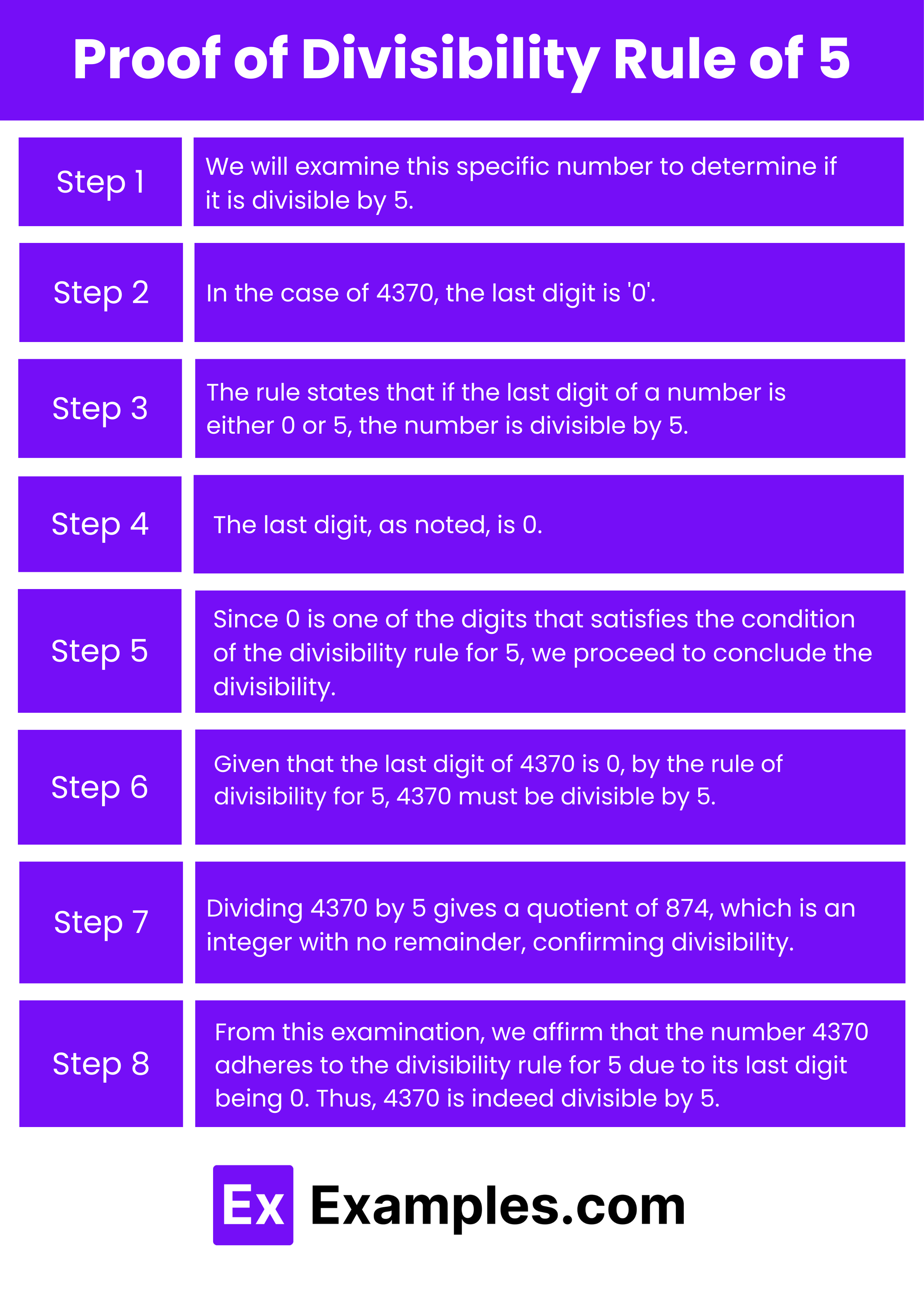Which of the following numbers is divisible by 5?
2347
12345
6789
2468


The divisibility rule for 5 is a fundamental principle in mathematics that states a number is divisible by 5 if its last digit is either 0 or 5. This rule simplifies the process of determining divisibility without needing complex division, serving as a cornerstone in the study of integers and rational numbers. In algebra, understanding this rule aids in manipulating expressions and solving equations that involve multiplication and division. It applies exclusively to integers, as irrational numbers do not conform to divisibility rules. Mastery of this rule enhances efficiency in mathematical operations such as addition, subtraction, multiplication, and division, facilitating quicker mental calculations and problem-solving strategies.
Download Proof of Divisibility Rule of 5 in PDF

Download Proof of Divisibility Rule of 5 in PDF
We will examine this specific number to determine if it is divisible by 5.
In the case of 4370, the last digit is ‘0’.
The rule states that if the last digit of a number is either 0 or 5, the number is divisible by 5.
The last digit, as noted, is 0.
Since 0 is one of the digits that satisfies the condition of the divisibility rule for 5, we proceed to conclude the divisibility.
Given that the last digit of 4370 is 0, by the rule of divisibility for 5, 4370 must be divisible by 5.
Dividing 4370 by 5 gives a quotient of 874, which is an integer with no remainder, confirming divisibility.
From this examination, we affirm that the number 4370 adheres to the divisibility rule for 5 due to its last digit being 0. Thus, 4370 is indeed divisible by 5.
A number is divisible by 5 if its last digit is either 0 or 5. This rule makes it easy to scan numbers and identify those divisible by 5. For example:
A number is divisible by 10 if its last digit is 0. This rule is even simpler than the one for 5 because only numbers ending in 0 can be evenly divided by 10 without leaving a remainder. For example:
A number is divisible by 5 if its last digit is either 0 or 5. This test is straightforward and easily observable by examining the final digit of the number. For example:
Regardless of the size of the number, check the last digit. If it is 0 or 5, then the number is divisible by 5.
Yes, the rule applies to all integers, positive or negative. The last digit of the number determines divisibility, not the sign.
Yes, if both the numerator and denominator end in 0 or 5, you can divide both by 5 to simplify the fraction.
In our base-10 number system, any number ending in 0 or 5 is a multiple of 5, hence the rule holds.
Yes, for divisibility by 10, the number must end in 0. For divisibility by 2, the number must end in an even digit (0, 2, 4, 6, or 8).
No, there are no exceptions. If the last digit is 0 or 5, the number is divisible by 5 without exception.
It speeds up processes such as factorization and simplification, especially in algebra and arithmetic operations.
Errors in identifying divisibility may lead to incorrect simplifications or solutions, especially in calculations involving multiple steps or equations.
In financial contexts, quick divisibility checks can help when calculating discounts, sales prices, or when tallying amounts that involve multiples of 5 dollars, simplifying mental math and reducing errors.
Text prompt
Add Tone
10 Examples of Public speaking
20 Examples of Gas lighting
Which of the following numbers is divisible by 5?
2347
12345
6789
2468
If a number ends in 0, what can be said about its divisibility by 5?
It is not divisible by 5
It is divisible by 2 but not 5
It is divisible by both 5 and 10
It is divisible by 5 but not 2
Which number among the following is not divisible by 5?
470
915
138
250
What is the result when you divide 435 by 5?
85
86
87
88
Which of the following statements is true?
A number ending in 7 is divisible by 5
A number ending in 3 is divisible by 5
A number ending in 0 or 5 is divisible by 5
A number ending in 8 is divisible by 5
How can you quickly determine if 920 is divisible by 5?
Check if it ends in 1
Check if it ends in 5
Check if it ends in 0
Check if it ends in 3
What is the quotient when 1500 is divided by 5?
300
350
250
500
Which of the following numbers is divisible by 5?
1647
4310
2893
7564
What is the remainder when 865 is divided by 5?
0
1
2
3
If a number ends in 5, what can be said about its divisibility by 5?
It is not divisible by 5
It is divisible by 5
It is divisible by 2
It is divisible by 10
Before you leave, take our quick quiz to enhance your learning!

